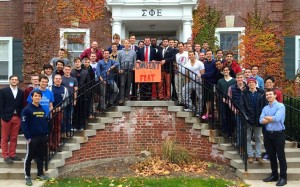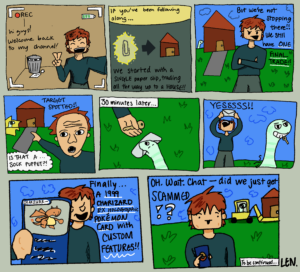In the past year and a half, the controversy surrounding Robin Thicke and his song, “Blurred Lines,” has infiltrated social media and discussions of feminism across the country. Many protested the song for trivializing sexual consent and being utterly misogynistic. The song was used as “Exhibit A” in showing the prevalence of rape culture in the Western world. In fact, it was so heavily opposed that it was banned in 20 universities in the United Kingdom actually banned the song entirely.
Inspired by all the controversy, activist groups from around the country have begun spreading the word about the importance of consent.
Sophomore Tate Richards recently became University of Rochester’s representative for “Consent is So Frat,” an organization that “seeks to promote a culture of consent within fraternities and the Greek system,” according to their mission statement. The organization is made up of a collection of fraternity brothers and sisters that work together to educate and spread awareness about sexual violence and rape culture on college campuses.
“Consent is So Frat” was started by class of 2014 graduate of Wesleyan University Matt Leibowitz this past summer. As a member of Alpha Epsilon Pi, he worked as a consent activist and wanted to continue his work nationally even after graduation, inspiring him to found “Consent is so Frat.”
According to Leibowitz, Consent is so Frat works to “make promoting consent and preventing sexual assault part of what it means to be in a fraternity or sorority”. Members work with Greek organizations about what they can do to make it part of what the organizations represent.
Leibowitz said that the main goal of the organization is to connect more Greek organizations with the tools needed to talk about consent and sexual assault around their campus. “The idea is to create a movement within Greek life to begin doing this work,” Lebowitz said, whether it’s through “Consent is So Frat” or other organizations on campus.
The organization also connects with sexual assault prevention organizations about what they can do to connect with Greek life. “The real goal is to connect the two worlds,” he said.
The organization functions to both help groups that are interested in starting these conversations about consent and support groups that are already doing this kind of work. Many fraternities and sororities sexual assault awareness offices reach out to the group to get connected to the tools necessary for this kind of work, but the group may also use social media to correspond with fraternities that are already making strides when it comes to these topics.
As representative of our university, Richards said that his main role is to “[work] to educate all members of our Greek community about consent.” He strives to get every Greek organization to contribute to the national campaign by attending their chapter meetings and addressing “what consent is, what constitutes consent, and why consent is so important.”
“I hate that rape culture exists and…when fraternity brothers lose sight of what a fraternity is,” Richards said. “Fraternities are organizations that are founded on fantastic principals, and men are to be made better because of their fraternity: [these] men should be leaders in fighting sexual violence rather than contributing to it.”
At UR, groups like MOVE and SEGway have already taken on the task of educating the student body about the importance of self-respect and putting a stop to rape culture, and “Consent is So Frat” will only add to the success of the campus movement. “Consent is So Frat represents a national movement of men and women involved in Greek life standing unite against rape culture,” Richards said. “The true value of this organization is that there are people all over the country who are doing exactly what I am doing to end sexual assault in Greek life for good.”
By laying down the tracks to connect fraternities and sororities nationally in the conversation of consent, “Consent is So Frat” is ushering in a new era of education and protection concerning sexual assault on campus. It is encouraging the idea that the very fraternities that might be the target of allegations of sexual assault are united in the effort of preventing it, and are willing to encourage discussions and really put the idea of consent in everyone’s minds.
Kanakam is a member of the class of 2017.

